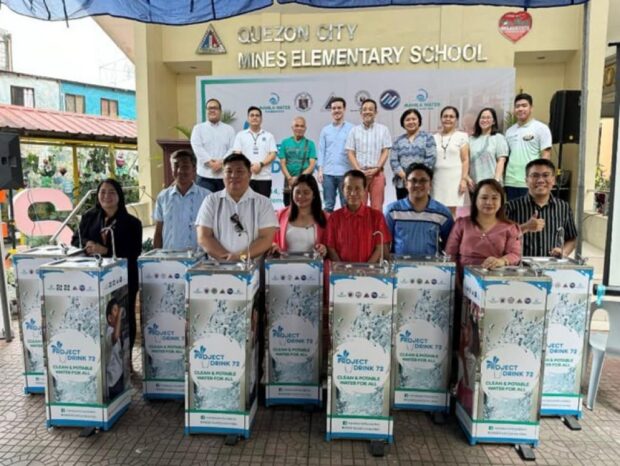Manila Water, Manila Water Foundation complete handover of 72 refrigerated drinking fountains to QC public schools

MANILA, Philippines — Manila Water and its social development arm Manila Water Foundation (MWF) have completed the handover of 72 refrigerated drinking fountains (RDFs) to public schools and institutions in Quezon City under Project Drink 72.
The project culminated in an event held at Mines Elementary School in Quezon City wherein Manila Water and MWF turned over RDFs to ten (10) public schools composing the last batch of the project’s beneficiaries.
The event was attended by Manila Water President and CEO Jocot De Dios, Quezon Ctiy 1st District Rep. Arjo Atayde, Department of Education-Quezon City Schools Division Superintendent Carleen Sedilla, Mines Elementary School Principal Maria Teofila Baconawa, representatives of school beneficiaries, barangay leaders and students.
Aside from the RDFs, the schools also received boxes of Ascorbic Acid Poten-cee from Pascual Laboratories, Inc., and Happy Meal toys from Ronald McDonald House Charities.
A total of 72 public schools and public institutions in Quezon City received RDFs, benefitting a total of 137,984 students, teachers, and non-teaching staff.
Article continues after this advertisementIn his message, Atayde underscored the importance of prioritizing water access, sanitation and hygiene or WASH in the education sector, and the key role of the private sector in achieving these.
Article continues after this advertisement“Water as we all know, is crucial to life. Access to clean water, sanitation facilities and hygiene education are the cornerstones of a healthy and thriving learning environment. These fundamentals are often taken for granted, but they form the very foundation upon which a child’s education is built. As illness and poor nutrition have been proven to negatively impact the ability of the children to learn properly, easy access to clean water, for example, is vital,” Atayde said.
READ: Manila Water Foundation releases second wave of RDFs for Project Drink 72
“The unfortunate reality is that many of our public schools lack the resources to provide these essential elements. This is where the significance of partnerships like this, with the private sector, comes into play. So today, we express our heartfelt gratitude to the Manila Water Foundation for recognizing the needs of our public schools and taking concrete steps to address it,” he added.
Project Drink 72 is part of MWF’s program Lingap Eskwela, an infrastructure development program that provides stand-alone water, sanitation, and hygiene facilities in learning institutions in support of the WASH in Schools program of the Department of Education. Lingap Eskwela provides RDFs, hand and oral hygiene info-education materials and education sessions, ensuring that students, teachers, and staff have access to clean, and potable water.
Aside from health and proper hygiene, Manila Water also hopes to impart to learners the responsible use of water, especially with the challenges the water sector is currently facing.
“Patuloy po yung mga kampanya natin para matuto kayo kung paano pahalagahan ang tubig. Hindi po madali ang tubig, 95% ng ating tubig ay nanggagaling sa Angat. Isang source pa lang yan. Kapag medyo masama ang klima, may climate change, may global warming, napapansin nyo po usually ang mga bagyo na dumadaan sa ating bansa mga 24-25, ngayong taon ang record kaunti, the least number. Hindi tayo halos naapektuhan. Sa isang panig maganda po yan kasi wala masyadong napipinsala, pero sa kabila po nyan ang ating katubigan medyo matutuyo especially sa summer, kapag tag-init. Kaya importante pong pag-aralan natin yung value ng tubig,” said De Dios, who is also the president of Manila Water Foundation.
(Our campaigns continue to educate you on how to appreciate water. Water is not easy to come by; 95% of our water comes from Angat. That’s just one source. When the weather is a bit unfavorable, with climate change and global warming, you usually notice fewer typhoons passing through our country, around 24-25 this year, the record is low, the least number. We are hardly affected. On one hand, that’s good because there’s not much damage, but on the other hand, our water sources may dry up, especially during summer, when it’s hot. So, it’s important for us to understand the value of water.)